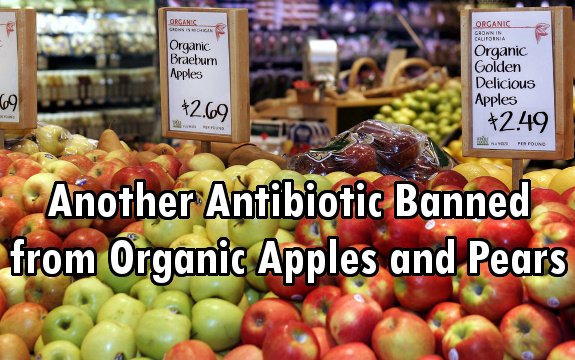Victory: NOSB Votes to Ban Another Antibiotic from Organic Apple and Pear Orchards

 Many real food advocates have complained that antibiotics have no place in the production of organic apples, pears, and other commercial fruit trees. Non-organic farmers were irritated with those of us who wanted to keep these super-bug causing drugs off our food. Just recently, the National Organic Standards Board (NOSB) decided to finally ban streptomycin from organic foods. And with another ban of tetracycline which was instated just over a year ago, organic apples and pears are finally safe from antibiotics.
Many real food advocates have complained that antibiotics have no place in the production of organic apples, pears, and other commercial fruit trees. Non-organic farmers were irritated with those of us who wanted to keep these super-bug causing drugs off our food. Just recently, the National Organic Standards Board (NOSB) decided to finally ban streptomycin from organic foods. And with another ban of tetracycline which was instated just over a year ago, organic apples and pears are finally safe from antibiotics.
Antibiotics were originally introduced as a temporary solution to fire blight, a tree disease that was taking over orchard’s blossoms, leaves, and shoots. These antibiotics were supposed to ‘sunset’ meaning that there allowable period for use was to expire, and be used no more than five years.
Unfortunately, last year the USDA issued a ruling stating that from now on, it will take a two-thirds majority to remove synthetics from the list of approved substances – and this included antibiotics.
Streptomycin didn’t face a simple sunset vote though; the NOSB had created a hard expiration date for the antibiotic several years ago, so a two-thirds majority was required to prolong its use. Typically, synthetic materials such as antibiotics are prohibited in organic production, but the NOSB can vote to make an exception to this rule.
The current allowance for organic growers to use the antibiotic streptomycin is set to expire on October 21, 2014, and in the recent NOSB meeting which met in San Antonio, Texas, the board decided to allow the antibiotic to sunset, or expire.
Food safety watchdogs have asked this of the USDA’s new ruling about synthetics – isn’t food bearing the organic seal supposed to be produced without the use of materials such as synthetic pesticides and factory-made fertilizers?
At an earlier meeting in the Spring of 2013 Glenn Morris, M.D, professor of infectious diseases in the University of Florida College of Medicine, stated the following:
“The question is do we go ahead and move forward at this point and stop the usage, given the data that we do have? I think if you say we wait for more studies, we are potentially talking years and a lot of money. And again, while I’m not speaking officially for IDS, the Infectious Disease Society of America (IDSA), I believe there is a letter from IDSA in your docket, and again the feeling very strongly from the Infectious Disease Society for America is, you know, it’s time to do it now.”
The evidence for streptomycin was even more compelling than it is for tetracycline. Streptomycin may be used later in the growing season, which can lead to more residues. Residues of streptomycin have been detected in fruit, as documented by an Austrian study that found highest residues in the core. The genes for streptomycin resistance that are carried on a plasmid are known to confer resistance to streptomycin in human pathogen, and streptomycin is classified as a critically important antimicrobial by the World Health Organization (WHO).
These comments and other activists complain that antibiotics or synthetics of any kind don’t belong on organic food are likely what forced the NOSB’s hand to uphold the ban, making our organic fruit safe to eat.
You can read further about antibiotics creating pest resistance in this report – “Antibiotics in Fruit Production.”
